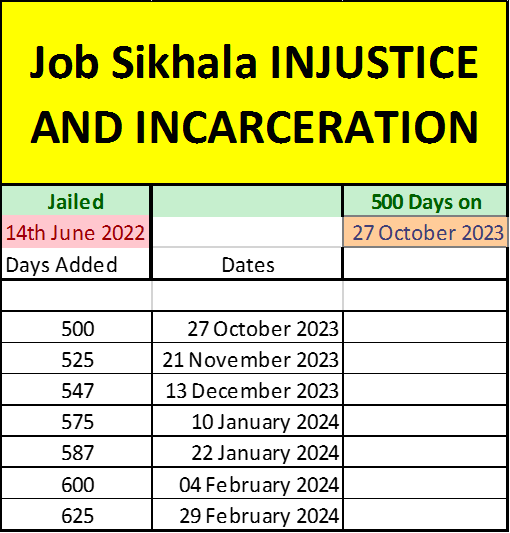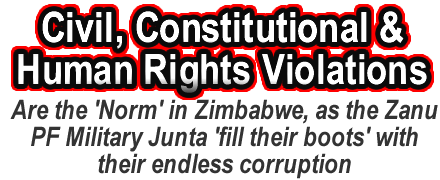 This morning, my eyes could not move from the image of opposition activist Job Sikhala as he disembarked from a prison truck. This was on his arrival for his conviction hearing two days ago, where he was found guilty of inciting violence by Harare Magistrate Tafadzwa Miti. As I fixed my attention on the picture, a plethora of feelings and emotions gripped (as if by some powerful indescribable force) my heart. At first, I was engulfed by a deep sense of pity for the man – as he stepped down from the truck – when I thought of the over one and half years he has languished in pre-trial detention. In all this, the courts have repeatedly denied him his right to bail – something held sacrosanct and guaranteed in section 70 of the country’s Constitution.
This morning, my eyes could not move from the image of opposition activist Job Sikhala as he disembarked from a prison truck. This was on his arrival for his conviction hearing two days ago, where he was found guilty of inciting violence by Harare Magistrate Tafadzwa Miti. As I fixed my attention on the picture, a plethora of feelings and emotions gripped (as if by some powerful indescribable force) my heart. At first, I was engulfed by a deep sense of pity for the man – as he stepped down from the truck – when I thought of the over one and half years he has languished in pre-trial detention. In all this, the courts have repeatedly denied him his right to bail – something held sacrosanct and guaranteed in section 70 of the country’s Constitution.
Then, immediately, another emotion took over.
This time, I could not help being overwhelmed by seething anger at this unpardonable cruelty by the Zimbabwe regime – which, it cannot be denied, has ensured this brave man is kept under lock and key.
Why?
- We all know – and so does the President Emmerson Dambudzo Mnangagwa administration – that Sikhala is possibly the only person in Zimbabwe courageous enough to take on the regime head-on.
- He is not afraid to mobilize the population into mass action – which is arguably the one thing that gives the corrupt and incompetent ruling elite sleepless nights.
- There is nothing else that terrifies those in power than the people of Zimbabwe rising up in their millions in finally saying ‘enough is enough’.
- We need to remember that there is enormous unstoppable power in numbers.
That is why, whenever I watch National Geographic Wild, I always hope one day those thousands (if not millions) of wildebeest would realize that, if they united and stood firmly together, they could actually defeat those lions!
In fact, as much as they may seem unrelenting in their onslaught on the opposition – nonetheless, the ruling establishment has so far ensured that they never attain power through elections. This is easily achieved through the wanton rigging of elections, intimidation of voters, restriction of democratic space, clampdown on the opposition, and abuse of state institutions. These are not mere baseless accusations plucked out of the air, but are facts even documented by various election observer missions, such as SADC and the EU.
As we speak, the main opposition lies in tatters, after some fierce internal squabbles – which are widely believed to have the backing of ZANU PF. In spite of these relentless attacks, the opposition has never had it in them to take any firm stance against the regime. They will talk and talk, promise and promise – whilst in all this, finding comfort in false hope and delusional thinking. Even I – had I been in power – would have never seen anything to be unnecessarily unnerved about with such an inept and inert opposition.
As such, the opposition is not regarded as a threat to the ruling party’s grip on power as much as Sikhala. The Zimbabwe regime can easily steal elections and sow seeds of division within the opposition hierarchy – whose own leadership abilities and devotion to democratic tenets are questionable. However, there is no way those on power can stop a people who are united by an uncompromising determination to stand up for their rights.
That is why the very thought of mass action is treated as some form of treason and insurgency – despite the fact that the right to peaceful demonstration is enshrined in section 59 of the Constitution. This explains the continued incarceration of Sikhala as the only person who has what it takes to mobilize the nation into peaceful action. A similar fate was faced by another opposition activist Jacob Ngarivhume – who was sentenced to four years in jail by Harare Magistrate Feresi Chakanyuka in April 2023 for supposedly, again, ‘inciting public violence’.
This, whilst without any prima facie evidence availed by the prosecution.
It was a good thing that High Court judges Pisirayi Kwenda and Fatima Maxwell overturned both conviction and sentence. However, this was after Ngarivhume had already served a nightmarish nine months of his sentence. That is just how the Zimbabwe regime is petrified by those who call for demonstrations – no matter how peaceful.
 As I was still looking at Sikhala's picture this morning, another feeling overpowered my thoughts. This was not the first time such painful images of imprisoned activists have touched the hearts of many people across the world. Who can easily forget those photographs of renowned South African anti-apartheid politician Nelson Mandela as he was being bundled into a prison truck?
As I was still looking at Sikhala's picture this morning, another feeling overpowered my thoughts. This was not the first time such painful images of imprisoned activists have touched the hearts of many people across the world. Who can easily forget those photographs of renowned South African anti-apartheid politician Nelson Mandela as he was being bundled into a prison truck?
This was soon after his life imprisonment sentencing, on 12th June 1964, at the notorious Rivonia Trial – together with seven other intrepid activists, such as Walter Sisulu and Govan Mbeki. Mandela was subsequently set free on 11th February 1990 after immense international outrage and pressure – leading to the opening of talks to end apartheid. I can also remember the images of then nationalist leader Robert Gabriel Mugabe as he sat pensively at Gonakudzingwa Restriction Camp after being jailed in 1964.
He was imprisoned there with leaders as Joshua Mqabuko Nkomo, Ndavaningi Sithole, Enos Nkala, Edgar Tekere, and Maurice Nyagumbo – only to be released in 1974 after pressure, ironically from apartheid South Africa.
- What was the outcome of the incarcerations of these prominent activists?
- Were the oppressive apartheid and colonial regimes able to crush the spirit and soul of these valiant men?
- Did they become forgotten nonentities who were rendered irrelevant to the struggle for the oppressed people’s emancipation?
No, not at all!
As a matter of fact, their profiles only soared throughout the world. They were viewed as brave heroes who had been subjected to the most horrendous unjust treatment by cruel pariah regimes. The calls for their freedom were chanted and echoed from all the corners of the globe. Who does not know of music concerts, as those held at Wembley Stadium in 1988 and 1990 – when international singers converged and sang with one accord in demanding the immediate release of Mandela?
In fact, had it not been for these prison sentences, it is most likely Mandela would not have become the first black president of a democratic South Africa.
The same applied to Mugabe in Zimbabwe!
Is it then any wonder why this man (Mugabe) loved reminding everyone on how he ‘fought and sacrificed’ for this country? We now witness similar scenes with Mnangagwa – as he wants everyone to know how he was incarcerated by the Rhodesia regime, even escaping the gallows by a whisker. This account’s authenticity is irrelevant at the moment, although it is highly questionable.
Nonetheless, the fact remains that these leaders we have, particularly in Zimbabwe, regard their imprisonment as some badge of heroism and entitlement to power. Indeed, they were turned into heroes by their jailing. So, why do they seem not to realize that repeating the same treatment on today’s activists only makes them not just local but global heroes? Who can deny that Sikhala’s name is now on the lips of many politicians, activists, journalists, and even ordinary people across the world?
What is left now is a mega concert in Wembley Stadium demanding the Mnangagwa regime frees Sikhala.
- In actual fact, this is not the only thing awaiting the activist.
- If history has taught us anything, then this brave man has now been unwittingly placed on the path to Zimbabwe’s presidency.
- The oppressor never wins at the end – but the oppressed and persecuted are always the victors who raise to the top!
I wonder why Mnangagwa and his regime do not appear to understand this simple truth.
